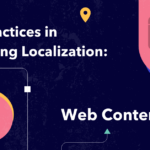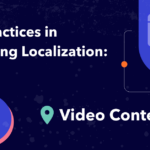
The language industry is having a moment. The ongoing global health crisis has forced organizations to break down borders and support a global remote workforce, requiring more cross-language interactions and coordination than ever before. At the same time, technological innovations in the language translation industry are at an all time high. We’ve never before had access to such sophisticated technology tools to manage translation processes.
I predict it’s going to be an exciting year in the industry, with an unprecedented level of innovation. Here are six specific predictions for what we’ll see in 2022.
1. Improved translation models
We’re in the midst of a shift from direct translation models to multilingual translation models. In late 2020, companies like Facebook and Google introduced sophisticated machine translation models that can navigate 100 languages at once, without relying on English as a middle step. The direct translation models that were previously used allowed us to translate one language into another, whereas these multilingual models integrate AI algorithms to translate one language into multiple output languages or vice versa.
Many of these new models were open sourced over the past year, priming us for an exciting year ahead where more and more companies will adopt and implement multilingual models. This improved modeling technology allows for faster and more cost-effective translations and will have a big impact on the industry in 2022.
2. Greater emphasis on responsible AI
We’ll continue to see greater adoption of AI in all facets of technology — including translation technologies. As the role of AI becomes increasingly important, it will be harder and harder to ignore the elephant in the room: AI has been shown to present many ethical challenges.
In 2021, we saw major companies like Facebook come under fire for the dark side of AI implementations. As a society, we’re more aware — and more concerned about — the impact that unchecked algorithms can have on our world. From gender bias to class bias, and beyond, I predict that we’ll have a global reckoning in 2022. More businesses will embrace responsible human-in-the-loop AI to combat these biases and reduce the risk of technology going rogue. Much like the world of data privacy, I believe we’ll see more issues about ethics in AI language algorithms come to light this year and legislation implemented to keep these algorithms in check.
3. Quality will matter more than ever
In addition to combating bias, I believe translation quality will matter more than ever in 2022. Language service providers will further differentiate their translation offerings on the basis of quality. Services and products will be judged by how well they integrate cultural nuance and account for tone. We’ve moved far beyond the days of Google Translate. Global consumers are no longer willing to forgive sloppy translations and overlook culturally irrelevant or insensitive speech and imagery. Today, a solid translation solution must combine the speed of a tool like Google Translate with the accuracy and local expertise of a native speaker.
At Unbabel, we’ve long emphasized the importance of quality. We made huge strides with COMET and our quality estimation technology, which positions us well to meet the needs of businesses in 2022.
4. Consolidation in the industry
Given the emphasis on ethical AI integrations and high-quality translations, I believe we’ll see a lot of consolidation in the language translation industry. Legacy language service providers aren’t built to incorporate AI technology into their offerings and are being out-innovated by technology-first startups that use AI as the basis for their offering. To stay relevant, legacy language providers will look to pair their scale and manpower with new, innovative technologies.
5. Translation layer across all entities of a business
As legacy language service providers look to integrate AI technologies, they’ll also look to expand their offerings to tackle translation and localization services for all facets of an organization. Gartner predicts a rise in customer engagement hubs (CEH), which they define as “an architectural framework that ties together multiple systems to proactively engage customers and ensures contextually relevant interactions at every stage of the customer journey.”
To successfully create these hubs for an international customer base, organizations will look to language service providers that can do more than just translate texts, chats, or emails. They’ll seek holistic solutions that integrate translation and localization efforts throughout customer service needs, marketing needs, and beyond. This is similar to Unbabel’s vision of Language Operations (a translation layer that works across every department within an organization), and we’ve recently taken another step toward achieving this reality with our acquisition of Lingo24.
6. Applications of language translation technology in the Metaverse
In addition to organizations placing a larger emphasis on language translations across operations, I believe we’ll also see language become a key element of newly emerging technologies.
Lines between real worlds and virtual worlds are blurring as networks like the Metaverse take hold. The Metaverse provides an interesting opportunity to create a “language-less” community that aids seamless communication across its user base — no matter where users are based. I believe it will become a sandbox of sorts for the translation industry. In these cloud-based communities, we have the opportunity to implement a translation layer as a baseline function of the network. This is an exciting opportunity to create a testing ground for more advanced translation solutions and practices, and to tackle some of the issues around bias in AI from the ground up.
Are you ready for the year ahead? Schedule a demo of Unbabel today to level up your language translation efforts in 2022.











